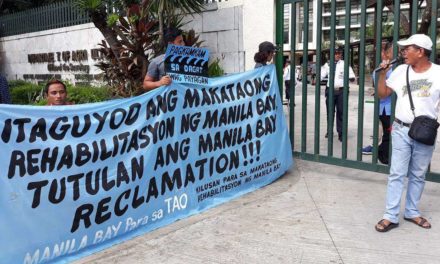Afsar Jafri*
On 3rd June, the Municipal Corporation of Greater Mumbai (MCGM) held a stakeholders meeting in which the New Zealand based consultant group Castalia (hired by the World Bank and the Public Private Infrastructure Advisory Facility) to conduct a study in the K-east ward of Mumbai, presented their findings and recommendations after a year-long study, for the Water Distribution Improvement Programme (WDIP). The meeting was attended by the MCGM Labour Union, K-east ward residents, activists, experts in water management and a few elected representatives. Shyamal Sarkar of the World Bank (WB) and Bhavna Bhatia of the PPIAF were special invitees. The presence of the citizens, labour unions and activists proved disastrous for Castalia and the World Bank. Both organisations were exposed for presenting a report based on inflated data in order to push through water privatisation.
Brief History:
In mid 2004, the PPIAF (a consortium which includes the World Bank) approved a grant of US $6,92,500 (approx. Rs. 30 million) for assisting Mumbai in procuring suitable consultants with international experience in private sector participation in water supply services, specifically in preparation of bid documents, for pre and post qualification of bidders for the implementation of management contract in the in K-east ward (Andheri, Jogeshwari and Vile Parle) of Mumbai city. The PPIAF also authorized the World Bank to be the executing agency for the grant. The K-east ward is one of the most profitable wards for the MCGM where the operating cost of water is Rs. 65 million, while revenue collection is Rs. 400.43 million per annum. The choice of K-east ward is therefore strategic because it is bound to result in successful implementation of the management contract.
The PPIAF and the World Bank appointed Castalia for the K-east WDIP (Water Distribution Improvement Project) study and a Contract and a ToR (Terms of Reference) was signed between the World Bank and Castalia (a French consultancy firm having its offices in New Zealand and USA). Castalia was expected to study, design and develop a model so as to eventually curb water leakage, pilferage and contamination and ensure an efficient 24×7 water supply through outsourcing the services to a multinational private operator. If successful, this pilot project in K-east ward would soon be replicated in the rest of Mumbai.
What happened at the workshop?
The Additional Commissioner (Projects, MCGM) Manu Kumar Srivastava began the proceedings by clarifying that “they had no pre-conceived notions of any management style for improving water distribution in K-east”. This statement was in sharp contradiction to the “inbuilt provision of the Contract and the Terms of Reference (ToR) which proposed “a public private partnership management model for bringing in water reforms”. It also became evident in Castalia’s presentation and recommendations that they, in fact, had been commissioned exclusively for activating a privatization process complete with setting up the logistics for selection of a private agency for the same. This conclusion is borne out by the fact that Castalia’s findings to support some such form of privatization was based on insufficient research, unreliable technology, inaccurate methodology and specious logic, resulting in MCGM themselves finding their report unacceptable.
Srivastava also conceded that since there was “no report” from Castalia till date, another stakeholders’ meeting would be held with adequate time for the stakeholders to deliberate over the subsequent submissions of Castalia, before any conclusive decision would be taken by MCGM. Interestingly, T.V. Shah, former Chief Hydraulic Engineer (MCGM) and now on Special Duty, confirmed that Castalia’s report submitted earlier was categorically rejected by the MCGM. Mr. Shah in his presentation said that “they do not agree with the figures and findings of the report. The figures enumerated in the study are mere approximations and fail to present the true picture of water distribution in the ward”. Mr. Shah also said that the Hydraulic Department engineers are quite capable of improving the water supply and can even provide 24×7 supply but it is due to the inherent limitations in the department that they are incapable of doing this (e.g. the water engineers don’t have powers to purchase an equipment worth Rs. 250).
Castalia recommendations:
David Ehrhardt, MD of Castalia, made recommendations for improving water supply which were a combination of outsourcing contracts to private agencies on the basis of his findings. According to Castalia’s study, the K-east get 540 million liters daily (mld), out of which 252 mld is supplied to three wards including K-west, H-east and H-west wards, and the K-west alone gets its 113 mld entirely from K-east. So the ‘unaccounted for water’ in K-east ward is inordinately high, at 21% (114 mld out of 540 mld, while the total leak in the Mumbai city is only 550 mld out of 3250 mld).
Going by the water balance arrived at from MCGM figures, this shows that K-west was generating water (billing more than the water supplied) since MCGM’s billing was 170 mld. This also implied zero leakage in K-west against 21% in K-east!
Interestingly, despite projecting an inflated leakage figure, Castalia failed to pin-point the sites where pipes are leaking. Nor could they find a single case of large scale illegal consumption. Mr. David also fumbled when he was asked whether the leaks are in the main pipeline or in the distribution outlets. Though the leakage figure showed by consultant is quite high yet they could not find a single case of contamination, even though high leakage should lead to high incidence of contamination. Surprisingly, the report shows supply to slum-dwellers was 134 liters per person per day (lpcd). When the norm in Mumbai is 90 lpcd for slums, the study failed to justify the need for improvement.
Most importantly, when drilled by the public about equipment and methodology used for measurement, David was forced to concede that due to lack of other options, they used inappropriate methods and obsolete instruments (e.g. insertion flow meters) not preferred anywhere else in the world. He also admitted that a high degree of error in the readings was possible due to this. Mr. David also pointed out some operational and logistical lacunae in the MCGM functional set-up, which constrained the MCGM and where reforms were necessary.
The overview presented by Ehrhardt used convoluted logic to make imperative the need for 24×7 supply given high leakage, and therefore to outsource/ privatize water distribution to private operator. The unanswered question remained that leakages could only increase if supply (water flow) is increased from 6 hrs to 24 hours. A matter of grave concern to the citizens was the complete silence from the Addl. Commissioner (MCGM) and the World Bank representative on the prevarications and anomalies in Castalia’s presentation.
The privatisation agenda:
Castalia recommended that MCGM hand over the responsibility of water distribution in K-east to a single private operator. They recommend five different non-departmental management options which are into two parts “outsourcing options” and “Public Private Partnership (PPP)”.
Under Outsourcing options, the first one is Multiple Small Contracts for 1-2 years in which integrated water loss reduction programme (IWLRP) (which include detect and repair leaks, stopping illegal use, creating pressure zones after studying elevations, metering, bulk meters mains) as well as laying slum networks to be outsourced to different private firm while bill collection, operations, management of ward, customer service and the capital fund will remain with the MCGM; and secondly, the Single Medium Term Performance Contract for 6 years in which customer service, IWLRP and slum networks will be outsourced to single firm on integrated performance contract and rest will be managed by the department.
Under the PPP options, they recommend, the Management Contract for 4-6 years in which a private firm will manage the ward while rest will be with the department; secondly, the Lease for 10-15 years in which the fund capital will be with the department while rest will be with the Lease Contractor and the last option is Concession model for a period of 15-30 years in which a private firm will take over operating, maintenance and capital costs on a pre-agreed fee per liter of water delivered.
Castalia ignored the option of improvement within the current structure under the Hydraulic Department of the MCGM. Yet, their finding shows that the water supply system in Mumbai is the best in South Asia and the water supply in the K-east ward is comparable to London and Germany. As per Castalia’s findings the average water consumption in K-east non-slums is 250 lpcd (equal to Shanghai), while in the slums the average consumption is 134 lpcd which is as high as an average consumption in developed European countries like Germany (129 lpcd) and London (150 lpcd).
When Addl. Commissioner was questioned on improving the internal functional set up to augment water reforms, he agreed to consider a proposal from the Hydraulic Department on their vision on improving water supply in the K-east.
It was very surprising to see the World Bank associated with a project like this where there is a complete lack of transparency, no updates on website, no deliverables, and change of ToR near the fag-end of the project. Mr. Shyamal Sarkar of WB, however, promised that the Castalia’s final report along with the revised Terms of Reference (ToR) will be put on the website within a week.
The task ahead:
However the Mumbai Paani (a group of concerned citizens and organizations which took up the cause to oppose the privatization of water in Mumbai after the PPIAF money was given for the study) network is quite apprehensive about future agenda of the World Bank to push water privatisation in Mumbai. Therefore Mumbai Paani has worked on an action plan to educate the consumers in the K-east ward about the Castalia report, the MCGM officials hidden support to the privatisation process and WB/PPIAF agenda to push for public private partnership. Mumbai Paani along with all the other civil society organizations in the K-east plan to take out ‘Torch March’ to build up pressure on their local representatives in the Bombay Municipal Corporation (also called as MCGM) to completely reject the Castalia’s report and call for the withdrawal of the World Bank and the PPIAF from basic necessities like water. Mumbai Paani will also organise meetings with local residents, MCGM corporators and senior citizens of Mumbai to build up pressure on the municipal corporation to reject their plan for water reforms through private participation and initiate a process of public-public partnership (with the Hydraulic Engineer of the MCGM to help evolve a proposal) which can be the only possible solutions to deal with the current water problems.
*Afsar Jafri is a research associate with Focus on the Global South, one of he constituent groups of the Mumbai Paani network . He is based in Mumbai . (click here to contact him)




![[IN PHOTOS] In Defense of Human Rights and Dignity Movement (iDEFEND) Mobilization on the fourth State of the Nation Address (SONA) of Ferdinand Marcos, Jr.](https://focusweb.org/wp-content/uploads/2025/07/1-150x150.jpg)



